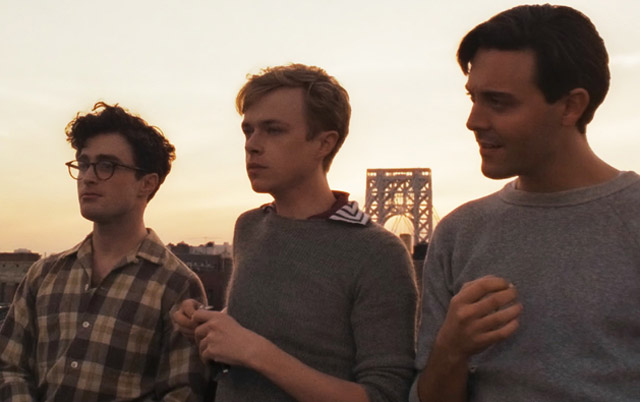CHICAGO – In anticipation of the scariest week of the year, HollywoodChicago.com launches its 2024 Movie Gifts series, which will suggest DVDs and collections for holiday giving.
Daniel Radcliffe Finds a Beat in ‘Kill Your Darlings’
 Rating: 3.5/5.0 |
CHICAGO – The movies has been berry berry good to 1950s Beat Generation poet Allen Ginsburg. For the sixth time since 2009, his persona is actualized on celluloid – this time by Harry Potter himself, Daniel Radcliffe – in the coming-of-age part of the poet’s story, “Kill Your Darlings.”
The title refers to the rejection of past heroes, in this case to forge the new Beat Generation of literary influencers after World War II. There is a murder as well, one of the weaker subplots of this intriguing before-the-beginning overview of Ginsburg, Jack Kerouac, William Burroughs and their support system. Radcliffe is up to the task, he puts a terrific spin on the Ginsburg sensibility, including a surprising sidebar involving his family. First time director (and script co-writer) John Krokidas shows a frenetic flair in using the camera as a storyteller, but doesn’t maintain the quick-cut pacing as the atmosphere grows more terse. In a sense there are two stories, and each one saps strength from the other.
The young Allen Ginsburg (Daniel Radcliffe) is bound for Columbia University in New York City. He is the son of poet and teacher Louis Ginsburg (David Cross) and mother Naomi (Jennifer Jason Leigh), who suffers from mental illness episodes. This home life affects Allen as he begins his freshman year, and he starts deviating from conventionality, aided by fellow students Lucien Carr (Dane DeHaan), Jack Kerouac (Jack Huston) and William Burroughs (Ben Foster).
 Photo credit: Sony Pictures Classics |
They seek to invent a “new vision,” fueled by intellectual curiosity and copious amounts of nicotine, alcohol and other substances. This situation becomes troubling when an old mentor, David Kammerer (Michael C. Hall), allows an infatuation with Lucien Carr to get out of hand. The Beat Generation is born through experimentation, free expression and even murder.
What is fascinating to any advocates of history or literature, is experiencing the development of the legends in this film as young bucks. It becomes a bit like Mad Magazine, as Ginsburg spies Kerouac talking to Burroughs, but that’s how it went down. There had to be a little magic – no Harry Potter jokes, please – in that time and place to get these masters together, to influence each other. The conformist post-war America was about to get shook up, and the vibrations from that earthquake are still going on.
The acting is fairly precise, there is an electricity to the portrayals that is virtuous towards the famous personalities. It’s nice to see Michael C. Hall back on screen, he’s memorable even in a thankless supporting role. Daniel Radcliffe seeks almost to exorcise his wizard being, taking his Ginsburg to an appropriate level of madness and transitional honesty as an openly gay man in 1944. There is a sensitivity in his scenes with Jennifer Jason Leigh, portraying his mother, and a sense of potency that enlivens the film. Even stalwart Elizabeth Olsen throws down in a walk-on role as Kerouac’s suffer wife, Edie Parker.
The focus on the origins of this particular Justice League involves the murder of Kammerer, which is weakest element in the story. The inability to flesh it out the motivations, amid trying to get all the characters established, led to a falling off of the narrative by the end of the film – it was too conclusive. The freestyle jazz of director John Krokidas and his quick cutting morphs into conventionality when dealing with the killing, and so goes the film. But there is enough intrigue within the biography to make the journey worthwhile.
 Photo credit: Sony Pictures Classics |
This film is also an essential lesson in the contrast between our era and the college freshman of 1944. That generation was tempered by war, with a knowledge of how short life could actually be – there were 420,000 American casualties between 1942 and 1945. The purpose of discovery, as embodied by the “new vision” that sprung from the Beat Generation, was born of an attitude after that bloody war. The urge to say “f**k you” to the nuclear age was powerful in these genius folks, whether fueled by drugs or not.
What is depicted in the film would later be inserted in “Howl,” Allen Ginsburg’s lightning rod of a poem. “I saw the best minds of my generation destroyed by madness, starving hysterical naked….” It had to start somewhere, and “Kill Your Darlings” provides a pretty good idea of “howl” it all began. Hey, at least it wasn’t a Potter joke.
 | By PATRICK McDONALD |


